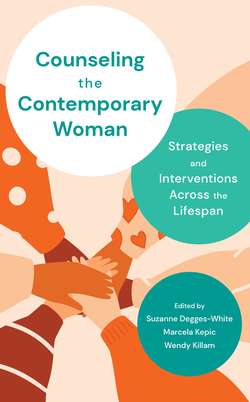Читать книгу Counseling the Contemporary Woman - Suzanne Degges-White - Страница 84
На сайте Литреса книга снята с продажи.
Romantic Relationships
ОглавлениеDuring emerging adulthood, individuals build romantic relationship skills that will help them improve the quality of later long-lasting relationship. The lessons learned when a relationship dissolves can be valuable as a person moves forward in life (Norona, Roberson, & Welsh, 2017). For emerging adults, intimate romantic relationships are important despite the fact that a growing number of people are choosing to stay single. For some there is a very real fear of being alone, which can result in involvement in negative romantic relationship. Singles in society today tend to be viewed in a negative fashion (Timmermans, Coenen, & Van den Bulck, 2019).
However, due to multiple sociocultural factors, emerging adult women tend to postpone marriage and pregnancy even though they enjoy a fully active sex life. Many women choose to pursue higher education and enter the workforce at a later age than in the past as well. These choices may contribute to emerging adults’ apparent delays in making formal commitments in their romantic relationships.
Although committed long-term relationships are common among emerging adults, the median age for first marriage is on the rise. In 2017, the median age was 27.4 for women and 29.5 for men; that’s almost three years older than twenty years ago (U.S. Census Bureau, 2018). Striking racial differences exist regarding age at first marriage; black or African American women tend to marry at age 32, American Indian and Alaskan natives at age 28.7, Asians at 27.6, and white and Hispanic or Latina women at a median age of 27.5. While the marriage rate has fallen, the rate of cohabitation has risen 29 percent in twenty years.
Not only do women today tend to stay single longer, they also have much more flexibility in terms of whom to date or marry, and how to date and when to marry. They also tend to embrace new ideas about romance and family, not necessarily conforming to the ideas of institutionalized traditional marriage. More than thirty years ago, Williams (1987) suggested that traditional marriage might be considered a vehicle for the oppression of women and that women were hindered from growing into their full potential within this institution. While women’s desire for full freedom and equality have not been fully met yet, there are many precursors that allow for much more liberation than previous generations achieved. Education allows women to enter the workforce in positions that were once reserved for men, birth-control technology helped with biological imperatives and allows women more control over their own bodies, and economic freedom liberates women from having to rely on another for basic needs. It was almost fifty years ago when O’Neil and O’Neil (1972) described the construct of the “open marriage.” This was described as a relationship of intimacy based on equal freedom and identity of both partners. The open marriage model includes the expectations that both partners will grow and change, that the partners will be different persons due to ongoing development, that each partner will accept responsibility for self and grant it to the other, that one partner cannot fill all needs of the other partner, and that children are not needed as proof of love for each other; their liking and loving will grow out of the mutual respect that the open relationship allows (Williams, 1987). These expectations resemble the values of personal growth, individual freedom, and flexibility. Such models encouraged new kinds of behavior in a committed relationship, and although some partners may feel the line should be drawn at a marriage that is open to extramarital relationships, the concept of a relationship that encourages egalitarian and individualistic values appeals to many contemporary individuals. While women’s entry into the workforce allows them to achieve significant occupational prestige, a stronger repertoire of socially valued competencies, and more economic independence, many still greatly value relationships and connectedness. They desire respect, trust, support, acceptance, emotional intimacy, loyalty, and security in their long-term romantic relationships and friendships as well.
